Farouk Gulsara's Blog, page 121
September 1, 2018
The cradle of civilisation
Published on September 01, 2018 16:25
August 30, 2018
Unresolved sibling rivalry?
Whatever Happened to Baby Jane? (1962)
 They use to say that blood is thicker than water. Logically, Nature would not want its own kind to destroyed. The selfish gene must surely want its continuity of species. The last thing that it would wish for is for hosts carrying somewhat similar genetic materials going for each other's jugular.
They use to say that blood is thicker than water. Logically, Nature would not want its own kind to destroyed. The selfish gene must surely want its continuity of species. The last thing that it would wish for is for hosts carrying somewhat similar genetic materials going for each other's jugular.
In life, however, sibling rivalry is genuine. Tales of the vengeful Cain over his younger brother, Abel, is one which had been in the annals of mankind as long as Man can remember (being Adam's offspring). Siblings, fighting for recognition over the other and yearning for requited love from their elders, have plunged them into the abyss of darkness to prove their point, sometimes unsuccessfully, with disastrous outcomes. Many victims of depression and adjustment disorders have blamed the stress of growing up with a high achieving person as possibly the prime cause of their malady.
In the Hollywood circle, primadonnas Betty Davis and Joan Crawford were notorious for running each other down; each trying to outdo the other. What better way to capture this animosity than through a movie about a feud between two sisters with showbiz thrown in for good measure?
In this 1962 psychological drama, Davis and Crawford are paired as Hudson sisters, Jane and Blanche. Their hatred towards each other goes as far back as 1917 when Jane was an acclaimed child vaudeville star, and her sister was the plain Blanche. Jane got all the attention whilst Blanche was the one who seems to give in. Their roles reversed as they got into adulthood when Blanche became a famous movie star and Jane had lost her spark. After a mysterious motor vehicle accident, Blanche became paralysed from her waist down. Hence, ended their movie careers. In the present (1962), they led quiet lives with Jane caring for her Blanche and Blanche confined to the upstairs.
 Reminds you of Kim Carnes' 80s hit 'Betty Davis' Eyes', does it not?
Reminds you of Kim Carnes' 80s hit 'Betty Davis' Eyes', does it not?
Jane is somewhat drinking too heavily and is mentally disturbed by her indulgence. Jane, still sore about her sister's previous success and her own loss of youth, that she has decided to put her bitterness on her sister. The strain of losing the limelight and people's recognition of Blanche as the star, rather than herself, added the pressure to already unstable emotions.
If the movie were indeed a showdown between these two doyens of the silver screen, Davis, being given a meatier role as the antagonist wins with hands down. Crawford, despite her excellent depiction of a paraplegic, had a somewhat subdued role to showcase her acting.
I could not help but compare this movie to the 1950 hit 'Sunset Boulevard' that also told the story of over-the-hill actress and her denial that her showtime is over. Herein must lie the problem, failure to accept that their time to take the bow is due!
https://asok22.wixsite.com/real-lesson

This work is licensed under a Creative Commons Attribution 4.0 International License.http://asok22.wix.com/real-lesson
http://.facebook.com/farouk.gulsara
www.riflerangeboy.com
 They use to say that blood is thicker than water. Logically, Nature would not want its own kind to destroyed. The selfish gene must surely want its continuity of species. The last thing that it would wish for is for hosts carrying somewhat similar genetic materials going for each other's jugular.
They use to say that blood is thicker than water. Logically, Nature would not want its own kind to destroyed. The selfish gene must surely want its continuity of species. The last thing that it would wish for is for hosts carrying somewhat similar genetic materials going for each other's jugular. In life, however, sibling rivalry is genuine. Tales of the vengeful Cain over his younger brother, Abel, is one which had been in the annals of mankind as long as Man can remember (being Adam's offspring). Siblings, fighting for recognition over the other and yearning for requited love from their elders, have plunged them into the abyss of darkness to prove their point, sometimes unsuccessfully, with disastrous outcomes. Many victims of depression and adjustment disorders have blamed the stress of growing up with a high achieving person as possibly the prime cause of their malady.
In the Hollywood circle, primadonnas Betty Davis and Joan Crawford were notorious for running each other down; each trying to outdo the other. What better way to capture this animosity than through a movie about a feud between two sisters with showbiz thrown in for good measure?
In this 1962 psychological drama, Davis and Crawford are paired as Hudson sisters, Jane and Blanche. Their hatred towards each other goes as far back as 1917 when Jane was an acclaimed child vaudeville star, and her sister was the plain Blanche. Jane got all the attention whilst Blanche was the one who seems to give in. Their roles reversed as they got into adulthood when Blanche became a famous movie star and Jane had lost her spark. After a mysterious motor vehicle accident, Blanche became paralysed from her waist down. Hence, ended their movie careers. In the present (1962), they led quiet lives with Jane caring for her Blanche and Blanche confined to the upstairs.
 Reminds you of Kim Carnes' 80s hit 'Betty Davis' Eyes', does it not?
Reminds you of Kim Carnes' 80s hit 'Betty Davis' Eyes', does it not?Jane is somewhat drinking too heavily and is mentally disturbed by her indulgence. Jane, still sore about her sister's previous success and her own loss of youth, that she has decided to put her bitterness on her sister. The strain of losing the limelight and people's recognition of Blanche as the star, rather than herself, added the pressure to already unstable emotions.
If the movie were indeed a showdown between these two doyens of the silver screen, Davis, being given a meatier role as the antagonist wins with hands down. Crawford, despite her excellent depiction of a paraplegic, had a somewhat subdued role to showcase her acting.
I could not help but compare this movie to the 1950 hit 'Sunset Boulevard' that also told the story of over-the-hill actress and her denial that her showtime is over. Herein must lie the problem, failure to accept that their time to take the bow is due!
https://asok22.wixsite.com/real-lesson

This work is licensed under a Creative Commons Attribution 4.0 International License.http://asok22.wix.com/real-lesson
http://.facebook.com/farouk.gulsara
www.riflerangeboy.com

Published on August 30, 2018 09:06
August 28, 2018
Equilibrium through destruction?
The Equalizer (2014)

Suddenly, somebody, I knew blurted out, "Hey, Equalizer 2 will out soon!"Not really remembering anything about the first Equalizer, I inquired, "Was it any good?" to which he babbled something to the effect of as if I had committed a cardinal sin. So I made it a point to view the film myself and I am not impressed.
I remember Appa used to be hooked to a TV series with the same name where a team of do-gooders went around helping desperate. I never went around watching it as I had many other pressing deadlines in my life then. Appa had a cult following for it but I would not say he was a die-hard fan. Halfway through the episode, he would be in Slumberland especially after his long hours spent in the bank working with other peoples' hard-earned money. So much for being an ardent fan!
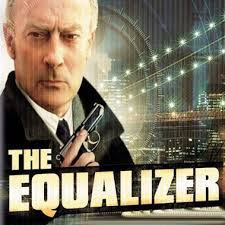 The TV seriesThis 2014 movie based on the TV series defies logic. Many of the executed plans are too far-fetched and bends reality so much that it appears almost like a sphere. Like many of films that glorify the 'Don't mess with Pop' genre, it is a feel-good movie that gives men who over their prime a boost of self-confidence. Whether it would translate it anything concrete, that is a different question.
The TV seriesThis 2014 movie based on the TV series defies logic. Many of the executed plans are too far-fetched and bends reality so much that it appears almost like a sphere. Like many of films that glorify the 'Don't mess with Pop' genre, it is a feel-good movie that gives men who over their prime a boost of self-confidence. Whether it would translate it anything concrete, that is a different question.
The story tells of a lone-wolf fighting against the whole might of the mean Russian mafia. An unassuming man who works as a supervisor in a DIY Home Improvement store has all the know-how and contacts to track down and hunts down every single baddie who made life a living hell for the people he knew in the neighbourhood. Like Robin Hood, he distributes the loot from the thugs.
At a philosophical level, the take-home message seems to be working at very high intellectual level (just a thought, though). To right a wrong, immense energy is required. Out of anarchy, comes order. To maintain peace, one needs destruction. For peace to be in place, might is necessary. For Vishnu is take charge, the Destroyer's job of Shiva is essential. The order is maintained through chaos.
I know I am going to give the sequel a miss.
https://asok22.wixsite.com/real-lesson

This work is licensed under a Creative Commons Attribution 4.0 International License.http://asok22.wix.com/real-lesson
http://.facebook.com/farouk.gulsara
www.riflerangeboy.com

Suddenly, somebody, I knew blurted out, "Hey, Equalizer 2 will out soon!"Not really remembering anything about the first Equalizer, I inquired, "Was it any good?" to which he babbled something to the effect of as if I had committed a cardinal sin. So I made it a point to view the film myself and I am not impressed.
I remember Appa used to be hooked to a TV series with the same name where a team of do-gooders went around helping desperate. I never went around watching it as I had many other pressing deadlines in my life then. Appa had a cult following for it but I would not say he was a die-hard fan. Halfway through the episode, he would be in Slumberland especially after his long hours spent in the bank working with other peoples' hard-earned money. So much for being an ardent fan!
 The TV seriesThis 2014 movie based on the TV series defies logic. Many of the executed plans are too far-fetched and bends reality so much that it appears almost like a sphere. Like many of films that glorify the 'Don't mess with Pop' genre, it is a feel-good movie that gives men who over their prime a boost of self-confidence. Whether it would translate it anything concrete, that is a different question.
The TV seriesThis 2014 movie based on the TV series defies logic. Many of the executed plans are too far-fetched and bends reality so much that it appears almost like a sphere. Like many of films that glorify the 'Don't mess with Pop' genre, it is a feel-good movie that gives men who over their prime a boost of self-confidence. Whether it would translate it anything concrete, that is a different question.The story tells of a lone-wolf fighting against the whole might of the mean Russian mafia. An unassuming man who works as a supervisor in a DIY Home Improvement store has all the know-how and contacts to track down and hunts down every single baddie who made life a living hell for the people he knew in the neighbourhood. Like Robin Hood, he distributes the loot from the thugs.
At a philosophical level, the take-home message seems to be working at very high intellectual level (just a thought, though). To right a wrong, immense energy is required. Out of anarchy, comes order. To maintain peace, one needs destruction. For peace to be in place, might is necessary. For Vishnu is take charge, the Destroyer's job of Shiva is essential. The order is maintained through chaos.
I know I am going to give the sequel a miss.
https://asok22.wixsite.com/real-lesson

This work is licensed under a Creative Commons Attribution 4.0 International License.http://asok22.wix.com/real-lesson
http://.facebook.com/farouk.gulsara
www.riflerangeboy.com

Published on August 28, 2018 09:01
August 26, 2018
Fear makes the world go around?
The answers on Earth are not easy to come by, especially when it comes to questions about the purpose of Life and ways to steer it. Why some people are born with all the options in life, with a silver spoon, in a rose garden, but are too blind to use them for their benefit while others have all the zest to do all the things in life to better themselves without any opportunities.
 Assoc Prof Munjed Al MuderiThis topic of discussion came up the other day when the story of an Iraqi doctor, now Assoc. Prof. Munjed Al Muderis, who was given a new lease on life in Australia after running away from his birth country flashed in a newsfeed somewhere. Dr Muderis was an ambitious young doctor in an Iraqi University when the Republican Guard showed up and ordered him to mutilate his patients who happened to be Iraqi soldiers. Refusing to conform, as it was against the Hippocratic Oath, he finally had to make a dash out of the country and eventually ended up in Christmas Islands as just another refugee with another number on his arm amongst the many Mohameds and Alis. Long story short, after enduring the denigration of being just another face in the list of exiles, the host country finally gave the good Professor a break to showcase what he had to offer to mankind.
Assoc Prof Munjed Al MuderiThis topic of discussion came up the other day when the story of an Iraqi doctor, now Assoc. Prof. Munjed Al Muderis, who was given a new lease on life in Australia after running away from his birth country flashed in a newsfeed somewhere. Dr Muderis was an ambitious young doctor in an Iraqi University when the Republican Guard showed up and ordered him to mutilate his patients who happened to be Iraqi soldiers. Refusing to conform, as it was against the Hippocratic Oath, he finally had to make a dash out of the country and eventually ended up in Christmas Islands as just another refugee with another number on his arm amongst the many Mohameds and Alis. Long story short, after enduring the denigration of being just another face in the list of exiles, the host country finally gave the good Professor a break to showcase what he had to offer to mankind.
Iraq's loss is Australia's gain. Or is it? His story is overshadowed by many who have been abusing the system as well. The Australian pioneers or any immigrant of the yesteryears to any country which is now successful had toiled blood, sweat and tears to make hay for their future generation to have what they did not. And sacrifices must have been aplenty - natural calamities, man-made disasters, diseases, freak accident, etcetera. All these were endured in the game of progress and stability.
Amongst the many of so-called refugees are shit-stirrers, who were the masterminds or were instrumental in the collapse of the country that they originated. The visitors had all the chances to make something out of the area that was marked out as a nation for them to prosper and mind their own businesses. But instead, they chose the path of annihilation. What assurances are there that they would not do the same for to their new host? These are difficult questions.
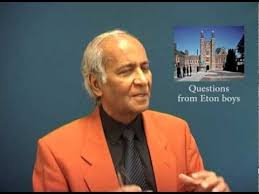 Jay Lakhani - Theoretical physicist and
Jay Lakhani - Theoretical physicist and
Speaker on Spiritual Humanism.
Advocates rational thinking into religion,
not blind faith.On the other end, should we just turn a blind eye to the human sufferings and walk away with our noses stuck up in the air? Can we blame the victims as just undergoing effects of the bad karma as if the fact as we, in the midst of all these are not being 'tested' on our karma chart ratings? Should we be altruistic and embrace everyone in a good spirit, pray Kumbayah and be convinced that love will save the day? Many a time we have seen mouths biting the hands that fed them, slaves slaying their owners and visitors overstaying their welcome but rule over the well-intended hosts to impose their failed ideology.
Should we build fences to keep them away or mend the broken fences that have plagued mankind since antiquity? Is that even possible? It seems that fear is the one that is making the world go around with all its drama, not love. Suspicion, greed, destruction and violence seem to delve Man deep into their thinking faculties to come up with innovations, not brotherly love.
https://www.amnesty.org.au/from-refugee-to-pioneering-surgeon-munjed-al-muderis/
https://asok22.wixsite.com/real-lesson
 This work is licensed under a Creative Commons Attribution 4.0 International License.http://asok22.wix.com/real-lesson
This work is licensed under a Creative Commons Attribution 4.0 International License.http://asok22.wix.com/real-lesson
http://.facebook.com/farouk.gulsara
www.riflerangeboy.com
 Assoc Prof Munjed Al MuderiThis topic of discussion came up the other day when the story of an Iraqi doctor, now Assoc. Prof. Munjed Al Muderis, who was given a new lease on life in Australia after running away from his birth country flashed in a newsfeed somewhere. Dr Muderis was an ambitious young doctor in an Iraqi University when the Republican Guard showed up and ordered him to mutilate his patients who happened to be Iraqi soldiers. Refusing to conform, as it was against the Hippocratic Oath, he finally had to make a dash out of the country and eventually ended up in Christmas Islands as just another refugee with another number on his arm amongst the many Mohameds and Alis. Long story short, after enduring the denigration of being just another face in the list of exiles, the host country finally gave the good Professor a break to showcase what he had to offer to mankind.
Assoc Prof Munjed Al MuderiThis topic of discussion came up the other day when the story of an Iraqi doctor, now Assoc. Prof. Munjed Al Muderis, who was given a new lease on life in Australia after running away from his birth country flashed in a newsfeed somewhere. Dr Muderis was an ambitious young doctor in an Iraqi University when the Republican Guard showed up and ordered him to mutilate his patients who happened to be Iraqi soldiers. Refusing to conform, as it was against the Hippocratic Oath, he finally had to make a dash out of the country and eventually ended up in Christmas Islands as just another refugee with another number on his arm amongst the many Mohameds and Alis. Long story short, after enduring the denigration of being just another face in the list of exiles, the host country finally gave the good Professor a break to showcase what he had to offer to mankind.Iraq's loss is Australia's gain. Or is it? His story is overshadowed by many who have been abusing the system as well. The Australian pioneers or any immigrant of the yesteryears to any country which is now successful had toiled blood, sweat and tears to make hay for their future generation to have what they did not. And sacrifices must have been aplenty - natural calamities, man-made disasters, diseases, freak accident, etcetera. All these were endured in the game of progress and stability.
Amongst the many of so-called refugees are shit-stirrers, who were the masterminds or were instrumental in the collapse of the country that they originated. The visitors had all the chances to make something out of the area that was marked out as a nation for them to prosper and mind their own businesses. But instead, they chose the path of annihilation. What assurances are there that they would not do the same for to their new host? These are difficult questions.
 Jay Lakhani - Theoretical physicist and
Jay Lakhani - Theoretical physicist and Speaker on Spiritual Humanism.
Advocates rational thinking into religion,
not blind faith.On the other end, should we just turn a blind eye to the human sufferings and walk away with our noses stuck up in the air? Can we blame the victims as just undergoing effects of the bad karma as if the fact as we, in the midst of all these are not being 'tested' on our karma chart ratings? Should we be altruistic and embrace everyone in a good spirit, pray Kumbayah and be convinced that love will save the day? Many a time we have seen mouths biting the hands that fed them, slaves slaying their owners and visitors overstaying their welcome but rule over the well-intended hosts to impose their failed ideology.
Should we build fences to keep them away or mend the broken fences that have plagued mankind since antiquity? Is that even possible? It seems that fear is the one that is making the world go around with all its drama, not love. Suspicion, greed, destruction and violence seem to delve Man deep into their thinking faculties to come up with innovations, not brotherly love.
https://www.amnesty.org.au/from-refugee-to-pioneering-surgeon-munjed-al-muderis/
https://asok22.wixsite.com/real-lesson
 This work is licensed under a Creative Commons Attribution 4.0 International License.http://asok22.wix.com/real-lesson
This work is licensed under a Creative Commons Attribution 4.0 International License.http://asok22.wix.com/real-lessonhttp://.facebook.com/farouk.gulsara
www.riflerangeboy.com

Published on August 26, 2018 09:01
August 24, 2018
That's why we sing!
 As if by the interference of the divine forces, in two seemingly unrelated events, coincidences happen. In the first, the name Giorgio Moroder was mentioned within a span of a day (after not having heard the name mentioned since the 90s). In the other, two podcasts featured on the same topic - speech difficulties and singing. The general understanding is that stammering and singing are apparently not compatible. Unlike 'The Who' who came up with their 1965 hit song "My Generation', where the lead singer tries to sing with a stutter, the general consensus is that stammerers cannot string the words before the next beat. Wrong.
As if by the interference of the divine forces, in two seemingly unrelated events, coincidences happen. In the first, the name Giorgio Moroder was mentioned within a span of a day (after not having heard the name mentioned since the 90s). In the other, two podcasts featured on the same topic - speech difficulties and singing. The general understanding is that stammering and singing are apparently not compatible. Unlike 'The Who' who came up with their 1965 hit song "My Generation', where the lead singer tries to sing with a stutter, the general consensus is that stammerers cannot string the words before the next beat. Wrong.In a documented case, as can be heard in the podcast below, an Indianapolis local resident, Ellen Spencer, was admitted for a neurological condition and came out of the hospital with a slurred speech. Even though at one look, her speech may sound like a French-accented English but on greater scrutiny, she had problems pronouncing certain syllables and had a bad lisp. Having no French ancestry or sojourn outside the country, her condition became what was considered a medical mystery. It was later found that she was suffering from 'Foreign Accent Syndrome'. As her life did not revolve around reading dialogues or reading news, her life went on by. She was thankful. However, she could still sing like an angel like she always had in the church, with all the right pronunciation, intonation and perfect pitch as well as modulation of voice. Amazing.

In yet another instance, a young man from Mumbai, Aditya Narayan (a.k.a. Aditya N.), with a stuttering problem faced a lot of difficulties trying to convince people in the Indian music industry to take him in. Despite his handicap in not being able to string complete sentences without hesitations, he persevered. Testimony of his achievement is his CV includes being amongst the doyens of the multi-billion movie and music industry. On top of all that, he sings, as seen in the link below the photo.
The wiring in our brain is somewhat different between speaking and singing. When one speaks, the sentences are strung in a particular manner which is open to choices. In singing, however, vocalisation works in tandem with preset beats and rhythm and not so open-ended. Hence, there is no pressure for all thoughts to be squeezed out through a single sentence. Perhaps, the brain is having difficulties of coordination as too many are trying to come out. Maybe, stammerers are teeming with ideas, and they have problems putting the best one forward.
N.B. Ed Sheeran, the two time Grammy Award winner, has the same stutter problem.
BBC Podcast: My Indian Life by Kalki Koechlin
https://asok22.wixsite.com/real-lesson

This work is licensed under a Creative Commons Attribution 4.0 International License.http://asok22.wix.com/real-lesson
http://.facebook.com/farouk.gulsara
www.riflerangeboy.com

Published on August 24, 2018 09:01
August 22, 2018
Which is your superpower?
 Avengers: Infinity War (2018)
Avengers: Infinity War (2018)
The first thing that I noticed was that there were too many superheroes and I had a difficult time trying to identify them. Some of them even look somewhat similar to my eyes. To me, one who is a slow learner of this genre, Captain America and Star-Lord has the same face-cut. Black Widow and Scarlett Witch look almost alike. Even Bruce Banner without his Hulk outfit and Iron Man seem to share a similar exoskeleton. Anyway, one gets the gist of the story as the story, which could have easily been plucked out of the Indian mythology.
Thanos, the protagonist, who wants to destroy half of the world's population to put things right. To do this, he needs to have in his possession some precious stones which are implanted in some superheroes. Just as seen in Hindu mythologies when an Asura is given a boon and he terrorises, all the Devas have to join forces to set order in the Cosmos, here the Avenger and the Guardian of the Galaxy teams put their resources together. Spoiler alert, Thanos wins in the end with many of the superheroes falling apart like powder. It sets nicely the platform for a sequel and something for the diehard fans to talk about until the next instalment is out. Dr Strange, the mystic and the seer, prophesied that this ending is the best (but for what?) It just gets more interesting.
Why are we so fascinated with superpowers? Perhaps, it is because we, as human beings, feel so vulnerable against the forces of Nature that we yearn for extraordinary abilities.
 Thanos at the closing scene, setting the
Thanos at the closing scene, setting the stage for the possible outcome of his
unlimited powers. Just the other day, I read of an ad-hoc study on people's preference for a superpower, if ever in their wildest dream were given a boon for invincibility. People gave many options but by far, most chose the ability to fly or the gift of invisibility. Researchers postulated that there was a clear distinction between people who chose either strength. Flyers tend to be extroverts and people who like to flash their ability. Men tend to opt for flying. Invisibility is preferred by the introverts, the social misfits and perhaps conniving individuals.
In that study, none of the people researched said that they chose their powers to save mankind, but to ease it for subversive activities like stealing, cheating and dodging buying tickets. Maybe mankind is innately evil.
https://asok22.wixsite.com/real-lesson
 This work is licensed under a Creative Commons Attribution 4.0 International License.http://asok22.wix.com/real-lesson
This work is licensed under a Creative Commons Attribution 4.0 International License.http://asok22.wix.com/real-lessonhttp://.facebook.com/farouk.gulsara
www.riflerangeboy.com

Published on August 22, 2018 09:09
August 20, 2018
Awful waste of space?
Cosmos: A Personal Voyage (Documentary; 1980)
Creator, Presenter: Carl Sagan
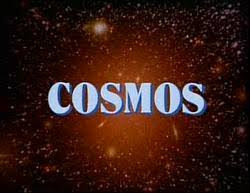
It all probably started over 13 billion years ago. A mammoth explosion which sent energy expanding across the universe gave light and mass. This expansion of space after the blast, by all accounts, is likely to be still ongoing as seen by the Doppler effect visible in the telescopic visualisation of distant stars. In cosmic terms, time probably started at that juncture. Then there was nothing for a very long time. Slowly with the cooling of the system, galaxies and stars came around. The earlier stars had short shelf lives. Their burning out of hydrogen fuels gave rise to other heavier atoms and supernovas that became the seed of our existence.
With carbon and oxygen came the blueprint of existence, water. By trial, chance and selection, the seed of life began. Slowly unicellular, then multicellular and complex creatures formed. DNA was found by Nature for continuity of life. With time a primitive reptilian brain evolved. As reptilian started becoming land creatures, some species developed more complex brain and a conscience.
These species of creatures turned out to be the most successful of nature's creations. They started exploring beyond their backyards. Some, however, refuse to use their new found neo-frontal cortex for the betterment of all of the universal's accidents but instead feel contented to let their actions be dictated by the primitive reptilian brain.
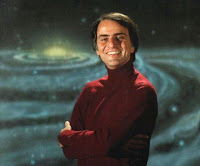 Carl SaganThey refuse to see their short-sighted view of instant short-term gratification. They fail to look at the fate that may befall them when deadly nuclear arsenals are hurled at each other. The uninhabitable nature of our neighbouring planets in the solar system should forewarn our leaders of the future that awaits us.
Carl SaganThey refuse to see their short-sighted view of instant short-term gratification. They fail to look at the fate that may befall them when deadly nuclear arsenals are hurled at each other. The uninhabitable nature of our neighbouring planets in the solar system should forewarn our leaders of the future that awaits us.
For times immemorial, people have shunned from knowledge, critical thinking and use of science to learn about ourselves. Again and again, the wealth of knowledge and scientific discoveries have been destroyed in the name of nonsensical belief and in the haste of wanting to enrich themselves and usurping power. Events in Alexandria and Nalanda are the testimony of these atrocities.
We, as human beings, do not indeed have the higher intelligence to live together in harmony with possible other life forms in the Universe. Talking about the possibility of finding another lifeform in the Cosmos, it appears like a Herculean task. We are however making strides towards this end. Multiple probes and spacecraft are apparently showing positive signs, according to scientists. We are working towards 'contact', not now, but perhaps for generations to come. The Universe is, after all, hell of a big space.
https://asok22.wixsite.com/real-lesson

This work is licensed under a Creative Commons Attribution 4.0 International License.http://asok22.wix.com/real-lesson
http://.facebook.com/farouk.gulsara
www.riflerangeboy.com
Creator, Presenter: Carl Sagan

It all probably started over 13 billion years ago. A mammoth explosion which sent energy expanding across the universe gave light and mass. This expansion of space after the blast, by all accounts, is likely to be still ongoing as seen by the Doppler effect visible in the telescopic visualisation of distant stars. In cosmic terms, time probably started at that juncture. Then there was nothing for a very long time. Slowly with the cooling of the system, galaxies and stars came around. The earlier stars had short shelf lives. Their burning out of hydrogen fuels gave rise to other heavier atoms and supernovas that became the seed of our existence.
With carbon and oxygen came the blueprint of existence, water. By trial, chance and selection, the seed of life began. Slowly unicellular, then multicellular and complex creatures formed. DNA was found by Nature for continuity of life. With time a primitive reptilian brain evolved. As reptilian started becoming land creatures, some species developed more complex brain and a conscience.
These species of creatures turned out to be the most successful of nature's creations. They started exploring beyond their backyards. Some, however, refuse to use their new found neo-frontal cortex for the betterment of all of the universal's accidents but instead feel contented to let their actions be dictated by the primitive reptilian brain.
 Carl SaganThey refuse to see their short-sighted view of instant short-term gratification. They fail to look at the fate that may befall them when deadly nuclear arsenals are hurled at each other. The uninhabitable nature of our neighbouring planets in the solar system should forewarn our leaders of the future that awaits us.
Carl SaganThey refuse to see their short-sighted view of instant short-term gratification. They fail to look at the fate that may befall them when deadly nuclear arsenals are hurled at each other. The uninhabitable nature of our neighbouring planets in the solar system should forewarn our leaders of the future that awaits us. For times immemorial, people have shunned from knowledge, critical thinking and use of science to learn about ourselves. Again and again, the wealth of knowledge and scientific discoveries have been destroyed in the name of nonsensical belief and in the haste of wanting to enrich themselves and usurping power. Events in Alexandria and Nalanda are the testimony of these atrocities.
We, as human beings, do not indeed have the higher intelligence to live together in harmony with possible other life forms in the Universe. Talking about the possibility of finding another lifeform in the Cosmos, it appears like a Herculean task. We are however making strides towards this end. Multiple probes and spacecraft are apparently showing positive signs, according to scientists. We are working towards 'contact', not now, but perhaps for generations to come. The Universe is, after all, hell of a big space.
https://asok22.wixsite.com/real-lesson

This work is licensed under a Creative Commons Attribution 4.0 International License.http://asok22.wix.com/real-lesson
http://.facebook.com/farouk.gulsara
www.riflerangeboy.com

Published on August 20, 2018 09:47
August 18, 2018
Of concordance and schisms
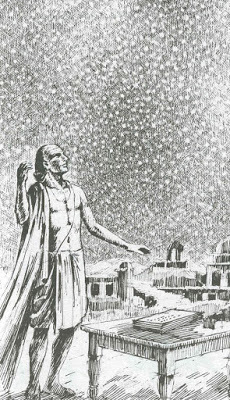 Aryabhata (476-550 CE)
Mathematician/Astronomer.
Aryabhata (476-550 CE)
Mathematician/Astronomer.

The first person to say that Earth is spherical and revolves around the sun. The first to suggest that any number divided by 0 gives infinity ∞. (pinterest)Continuing in the quest to make sense of things around me, I stumbled into something quite thought-provoking. It has something to do with our idea of separating knowledge into the sciences and the arts.
It is interesting to note that the Ionians, of the Eastern part of the Greek civilisation, and the Hindu culture started learning things about the world we live in entirely independent of each other. It is incredible how quite similar their discoveries were, at least in the initial stages.
The pre-Socratic thinkers thought that there was a connection between the Universe and the world immediately around us. Thales tried to say that water is the essence of our existence. Democritus put forward the theory of Void and eternal, indivisible atoms that made up our physical world. Pythagoras and his cult members attempted very hard to a mathematical formula for everything in the Cosmos, including music. His equations, he later realised, could be irrational at times. A case in point is the irrationality of √2. The hypotenuse of a right-angled triangle with dimensions of 1 X 1 cannot be calculated probably made him abandon his idea. From that time onward, another branch of knowledge is said to have developed - natural philosophy. Later philosophers quit looking at the stars for the answers but instead started gazing inwardly. They abandoned the physical sciences to rhetorics. Their idea of problem-solving was people watching. This type of wisdom continued all through Plato and subsequent sages. As we know Plato's teachings metamorphosed into Neoplatonic ideas which greatly influenced the Abrahamic religions.
Attempts to revive sciences through the works of Kepler, Copernicus and Newton met a lot of resistance from the society so ingrained in a kind of a dogmatic belief. Some of the branches of the Abrahamism realised their loss of grip on the flock and decided to move with the times while some found content in spewing their 6th-century or maybe 12th-century slightly improved ideologies.
On the other side of the world, in the Indus Valley, things progressed slightly differently. Their perspective of life on Earth seems to one that was devoid of the outside realm but of one that incorporated all the celestial bodies in the Universe. Till today, they appreciate significant events of the heavens like the birth of the new moon, the glory of the full moon and specific planetary positioning. Modern science is slowly agreeing to many of their old age believed traditions about the Cosmos and its cyclical manner of doing things. People of the Indian sub-continent continue showing their appreciations to things which are taken for granted in life. A simple example is the festival of Thai Ponggal or Makara Sankranthi which is celebrated during the Indic solstice as the sun enters the 10th house of the Indian zodiac Makara or Capricorn.
As more and more new things are discovered, one cannot fathom but only stand in awe trying to come in terms with how these ancient civilisations, with their rudimentary tools, were able to find things that were literally out of this world.
 Kepler-186f is an exoplanet about 550 light-years from the Earth. It is the first planet with a radius similar to Earth's to be discovered in the habitable zone of another star. (Wiki)
Kepler-186f is an exoplanet about 550 light-years from the Earth. It is the first planet with a radius similar to Earth's to be discovered in the habitable zone of another star. (Wiki) https://asok22.wixsite.com/real-lesson

This work is licensed under a Creative Commons Attribution 4.0 International License.
http://asok22.wix.com/real-lesson
http://.facebook.com/farouk.gulsara
www.riflerangeboy.com

Published on August 18, 2018 14:21
Of concordance and schisms!
 Aryabhata (476-550 CE)
Mathematician/Astronomer.
Aryabhata (476-550 CE)
Mathematician/Astronomer.
The first person to say that Earth is spherical and revolves around the sun. The first to suggest that any number divided by 0gives infinity ∞. (pinterest)Continuing in the quest to make sense of things around me, I stumbled into something quite thought-provoking. It has something to do with our idea of separating knowledge into the sciences and the arts.
It is interesting to note that the Ionians, of the Eastern part of the Greek civilisation, and the Hindu culture started learning things about the world we live in entirely independent of each other. It is incredible how quite similar their discoveries were, at least in the initial stages.
The pre-Socratic thinkers thought that there was a connection between the Universe and the world immediately around us. Thales tried to say that water is the essence of our existence. Democritus put forward the theory of Void and eternal, indivisible atoms that made up our physical world. Pythagoras and his cult members attempted very hard to a mathematical formula for everything in the Cosmos, including music. His equations, he later realised, could be irrational at times. A case in point is the irrationality of √2. The hypotenuse of a right-angled triangle with dimensions of 1 X 1 cannot be calculated probably made him abandon his idea. From that time onward, another branch of knowledge is said to have developed - natural philosophy. Later philosophers quit looking at the stars for the answers but instead started gazing inwardly. They abandoned the physical sciences to rhetorics. Their idea of problem-solving was people watching. This type of wisdom continued all through Plato and subsequent sages. As we know Plato's teachings metamorphosed into Neoplatonic ideas which greatly influenced the Abrahamic religions.
Attempts to revive sciences through the works of Kepler, Copernicus and Newton met a lot of resistance from the society so ingrained in a kind of a dogmatic belief. Some of the branches of the Abrahamism realised their loss of grip on the flock and decided to move with the times while some found content in spewing their 6th-century or maybe 12th-century slightly improved ideologies.
On the other side of the world, in the Indus Valley, things progressed slightly differently. Their perspective of life on Earth seems to one that was devoid of the outside realm but of one that incorporated all the celestial bodies in the Universe. Till today, they appreciate significant events of the heavens like the birth of the new moon, the glory of the full moon and specific planetary positioning. Modern science is slowly agreeing to many of their old age believed traditions about the Cosmos and its cyclical manner of doing things. People of the Indian sub-continent continue showing their appreciations to things which are taken for granted in life. A simple example is the festival of Thai Ponggal or Makara Sankranthi which is celebrated during the Indic solstice as the sun enters the 10th house of the Indian zodiac Makara or Capricorn.
As more and more new things are discovered, one cannot fathom but only stand in awe trying to come in terms with how these ancient civilisations, with their rudimentary tools, were able to find things that were literally out of this world.
 Kepler-186f is an exoplanet about 550 light-years from the Earth. It is the first planet with a radius similar to Earth's to be discovered in the habitable zone of another star. (Wiki)
Kepler-186f is an exoplanet about 550 light-years from the Earth. It is the first planet with a radius similar to Earth's to be discovered in the habitable zone of another star. (Wiki) https://asok22.wixsite.com/real-lesson

This work is licensed under a Creative Commons Attribution 4.0 International License.http://asok22.wix.com/real-lesson
http://.facebook.com/farouk.gulsara
www.riflerangeboy.com

Published on August 18, 2018 14:21
August 16, 2018
Got your nostalgic fix?
We are told that the fundamental need of man is simple. All he needs are food, sleep and the chance to procreate. The high water mark of procreation, the ecstasy of climax, must have been added by Nature to lure Man to help in the continuity of his species. With increasing complexity, when Man started living in communities, and social mores began creeping in, their fundamental needs zeroed on food, clothing and protection from the harmful elements of Nature. With further sophistication, when the society progressed, the essential things in life do not remain basic anymore.
There used to be a time when food was a necessity, or perhaps obligatory, for one's body to be able to burn enough energy for one to garner sufficient might to provide for his loved ones. With their God-given limbs, the immigrants and the sojourners alike tried to change their fate through sheer hard work and willpower. Whatever came their way which was nutritious and palatable was consumed for sustenance.
Now, food is a novelty. It has become an art form, an experience and an indulgence. With affluence, it has become an over-indulgence, actually. We no longer eat to live but rather live our lives to eat. This, we do despite knowing very well the ill-effect of gluttony and sloth. But we pamper ourselves with catchphrases like 'you only live once' and 'these are the simple pleasures of life'. 'You live once' may be true if you do not believe that karma is a bitch that would return to haunt the living days out of you to make you feel the pain of starvation, but that the life lived once should not be a burden to society and the immediate family members around you. But then, in your next life, you will not have any recollection of your past misdeeds!
During my trip to Penang recently, it came to my attention of a hawker who sold authentic Penang home-made coffee. His core business, his only one, is to sell coffee and in its various variants. That is it; somewhat like Starbucks minus the accompaniments. The irony of this unfancy hawker stall is that it is so famous that people from the island over throng to this joint. They do not mind waiting, sometimes more than half an hour sacrificing valuable time to enjoy their cuppa. Even outstation visitors were well aware of its caffeine-rich condensed milk sweetened blend. People do not seem to mind the somewhat unsophisticated surrounding of its premises.
On the contrary, I think it adds to its pull factor. People these days are suckers for nostalgia. Anything with a hint of our past sells (like hotcakes); unlike a time in our distant history when nostalgia was indeed a disease akin to what now term as PTSD!
 Note the somewhat orderly queuing of patrons. Malaysians are notoriously disciplined to appear obedient in two places: when buying food at a lowly joint like under a tree/ by the roadside or at a betting outlet (Magnum4D, Sports Toto or DaMaCai). Also, notice the symbiotic nature of the shops around the vicinity. Eateries mushroom the coffee pushcart to justify its existence! The sight of unplastered walls of buildings, I suppose, adds to the authenticity and the yesteryear feel to the beverages served. ©FG
Note the somewhat orderly queuing of patrons. Malaysians are notoriously disciplined to appear obedient in two places: when buying food at a lowly joint like under a tree/ by the roadside or at a betting outlet (Magnum4D, Sports Toto or DaMaCai). Also, notice the symbiotic nature of the shops around the vicinity. Eateries mushroom the coffee pushcart to justify its existence! The sight of unplastered walls of buildings, I suppose, adds to the authenticity and the yesteryear feel to the beverages served. ©FG
 The skyline of Penang; the complementary compromise of the old and the new. Living true to the idiom that 'one who forgets his past does not reach where he is going to', Penangites excel in the juggle of re-enacting the past to head for the future. It also helps that this exercise draws money. After all, money changes everything. ©FG https://asok22.wixsite.com/real-lesson
The skyline of Penang; the complementary compromise of the old and the new. Living true to the idiom that 'one who forgets his past does not reach where he is going to', Penangites excel in the juggle of re-enacting the past to head for the future. It also helps that this exercise draws money. After all, money changes everything. ©FG https://asok22.wixsite.com/real-lesson
 This work is licensed under a Creative Commons Attribution 4.0 International License.http://asok22.wix.com/real-lesson
This work is licensed under a Creative Commons Attribution 4.0 International License.http://asok22.wix.com/real-lesson
http://.facebook.com/farouk.gulsara
www.riflerangeboy.com
There used to be a time when food was a necessity, or perhaps obligatory, for one's body to be able to burn enough energy for one to garner sufficient might to provide for his loved ones. With their God-given limbs, the immigrants and the sojourners alike tried to change their fate through sheer hard work and willpower. Whatever came their way which was nutritious and palatable was consumed for sustenance.
Now, food is a novelty. It has become an art form, an experience and an indulgence. With affluence, it has become an over-indulgence, actually. We no longer eat to live but rather live our lives to eat. This, we do despite knowing very well the ill-effect of gluttony and sloth. But we pamper ourselves with catchphrases like 'you only live once' and 'these are the simple pleasures of life'. 'You live once' may be true if you do not believe that karma is a bitch that would return to haunt the living days out of you to make you feel the pain of starvation, but that the life lived once should not be a burden to society and the immediate family members around you. But then, in your next life, you will not have any recollection of your past misdeeds!
During my trip to Penang recently, it came to my attention of a hawker who sold authentic Penang home-made coffee. His core business, his only one, is to sell coffee and in its various variants. That is it; somewhat like Starbucks minus the accompaniments. The irony of this unfancy hawker stall is that it is so famous that people from the island over throng to this joint. They do not mind waiting, sometimes more than half an hour sacrificing valuable time to enjoy their cuppa. Even outstation visitors were well aware of its caffeine-rich condensed milk sweetened blend. People do not seem to mind the somewhat unsophisticated surrounding of its premises.
On the contrary, I think it adds to its pull factor. People these days are suckers for nostalgia. Anything with a hint of our past sells (like hotcakes); unlike a time in our distant history when nostalgia was indeed a disease akin to what now term as PTSD!
 Note the somewhat orderly queuing of patrons. Malaysians are notoriously disciplined to appear obedient in two places: when buying food at a lowly joint like under a tree/ by the roadside or at a betting outlet (Magnum4D, Sports Toto or DaMaCai). Also, notice the symbiotic nature of the shops around the vicinity. Eateries mushroom the coffee pushcart to justify its existence! The sight of unplastered walls of buildings, I suppose, adds to the authenticity and the yesteryear feel to the beverages served. ©FG
Note the somewhat orderly queuing of patrons. Malaysians are notoriously disciplined to appear obedient in two places: when buying food at a lowly joint like under a tree/ by the roadside or at a betting outlet (Magnum4D, Sports Toto or DaMaCai). Also, notice the symbiotic nature of the shops around the vicinity. Eateries mushroom the coffee pushcart to justify its existence! The sight of unplastered walls of buildings, I suppose, adds to the authenticity and the yesteryear feel to the beverages served. ©FG The skyline of Penang; the complementary compromise of the old and the new. Living true to the idiom that 'one who forgets his past does not reach where he is going to', Penangites excel in the juggle of re-enacting the past to head for the future. It also helps that this exercise draws money. After all, money changes everything. ©FG https://asok22.wixsite.com/real-lesson
The skyline of Penang; the complementary compromise of the old and the new. Living true to the idiom that 'one who forgets his past does not reach where he is going to', Penangites excel in the juggle of re-enacting the past to head for the future. It also helps that this exercise draws money. After all, money changes everything. ©FG https://asok22.wixsite.com/real-lesson
 This work is licensed under a Creative Commons Attribution 4.0 International License.http://asok22.wix.com/real-lesson
This work is licensed under a Creative Commons Attribution 4.0 International License.http://asok22.wix.com/real-lessonhttp://.facebook.com/farouk.gulsara
www.riflerangeboy.com

Published on August 16, 2018 09:30












